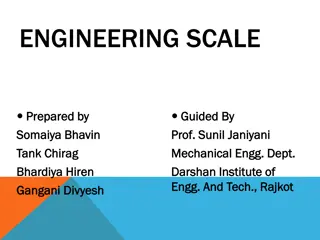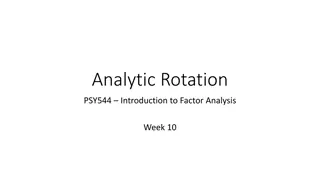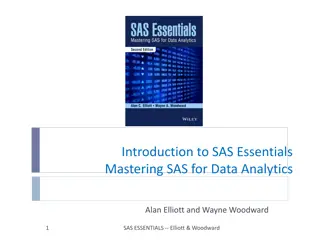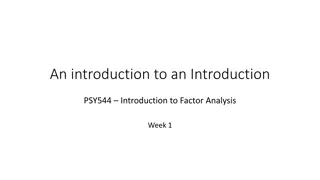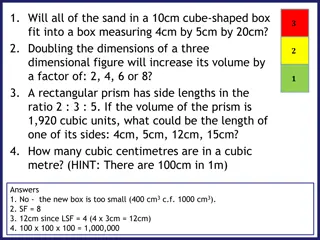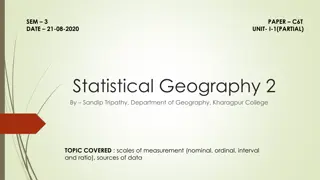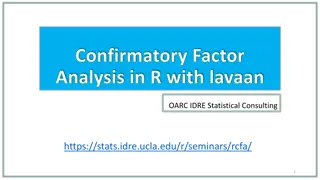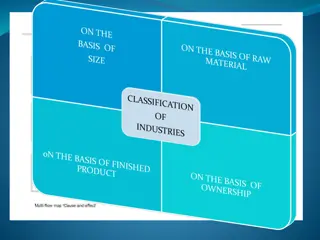Theories of Intelligence: Monarchie vs. Spearman's Two-Factor Theory
The Monarchie Theory of Intelligence posits a single factor of intelligence, while Spearman's Two-Factor Theory divides intelligence into a general ability (G-factor) and specific abilities (S-factors). The implications of these theories on educational practices are discussed, shedding light on the
11 views • 25 slides
Blood Clotting Factors in the Human Body
Blood clotting factors play a crucial role in the coagulation process to prevent excessive bleeding. Factors such as Fibrinogen (Factor-I), Prothrombin (Factor-II), Thromboplastin (Factor-III), Calcium Ions (Factor-IV), Labile Factor (Factor-V), and Stable Factor (Factor-VII) are essential for the c
7 views • 14 slides
Scale Factors and Ratios in Similar Figures
Explore the concept of scale factors and ratios in similar figures through visible learning intentions, warm-up exercises, and practical examples. Learn to determine the scale factor between two similar figures, use scale factors to find missing sides, and apply the knowledge in real-world scenarios
3 views • 13 slides
The Fitz Factor: Your Ultimate Fitness Guide
Discover the power of personalized fitness with The Fitz Factor, where expert advice meets real-life results. Our brand is dedicated to providing you with top-notch fitness tips, innovative workout strategies, and comprehensive wellness guidance. Whether you're looking to kickstart your fitness jour
2 views • 4 slides
The Fitz Factor: Your Ultimate Fitness Guide
Discover the power of personalized fitness with The Fitz Factor, where expert advice meets real-life results. Our brand is dedicated to providing you with top-notch fitness tips, innovative workout strategies, and comprehensive wellness guidance. Whether you're looking to kickstart your fitness jour
0 views • 4 slides
The Fitz Factor: Your Ultimate Fitness Guide
Discover the power of personalized fitness with The Fitz Factor, where expert advice meets real-life results. Our brand is dedicated to providing you with top-notch fitness tips, innovative workout strategies, and comprehensive wellness guidance. Whether you're looking to kickstart your fitness jour
0 views • 4 slides
The Fitz Factor: Your Ultimate Fitness Guide
Discover the power of personalized fitness with The Fitz Factor, where expert advice meets real-life results. Our brand is dedicated to providing you with top-notch fitness tips, innovative workout strategies, and comprehensive wellness guidance. Whether you're looking to kickstart your fitness jour
0 views • 4 slides
The Fitz Factor: Your Ultimate Fitness Guide
Discover the power of personalized fitness with The Fitz Factor, where expert advice meets real-life results. Our brand is dedicated to providing you with top-notch fitness tips, innovative workout strategies, and comprehensive wellness guidance. Whether you're looking to kickstart your fitness jour
0 views • 4 slides
The Concept of Return to Factor in Production Economics
Return to Factor is a key concept in production economics that explains the relationship between variable inputs like labor and total production output. The concept is based on the three stages of production - increasing returns, diminishing returns, and negative returns. By analyzing the behavior o
0 views • 7 slides
Importance and Types of Scale in Architecture
Scale is crucial in architecture for accurate designs and execution. Standard scales are used in architectural drawings to set object sizes, such as human scale and miniature scale. Human scale relates to human dimensions, while miniature scale reduces object sizes. Understanding these scales enhanc
1 views • 6 slides
The New Trade Theory and Economies of Scale in International Trade
The New Trade Theory, emerged in the 1970s, challenges traditional trade theories by emphasizing the role of increasing returns and economies of scale in international trade. It introduces the concept of industrial organization and imperfect competition to explain how countries trade not only based
1 views • 12 slides
Spearman's Two-Factor Theory
Spearman's Two-Factor Theory posits a general mental energy factor (g) and specific abilities factors (s), determining individual intelligence. The g factor is innate and crucial in various activities, while the s factor is acquired and varies per task. Despite criticisms regarding the oversimplific
0 views • 9 slides
Acids and Bases: pH Scale Explained
Exploring the pH scale, this content delves into the fundamentals of acidity and alkalinity, covering what pH stands for, the inventor of the pH scale, reactions when acids and bases combine, and where the weakest acids and bases are found on the pH scale.
1 views • 7 slides
Consultation on 2023/24 Fee Scale by PSAA: Key Points and Deadlines
PSAA is conducting a crucial consultation to set the fee scale for 2023/24, involving elements like audit fees, legal framework, and consultation details with stakeholders. The process includes setting scale fees, handling fee variations, adhering to statutory roles, and addressing the audit backlog
0 views • 30 slides
Psychometric Properties of Values Acceptance Mindfulness Scale (VAMS) for Ice Hockey Players
Preliminary psychometric properties of the Values Acceptance Mindfulness Scale (VAMS) for ice hockey players were evaluated with a sample of elite senior, youth, and women players. The VAMS demonstrated strong correlations with quality of life, depression, anxiety, stress, and experiential avoidance
0 views • 12 slides
Engineering Scale and Different Types of Scales
Engineering scale plays a crucial role in reducing or enlarging dimensions of large or tiny objects to fit standard size drawing sheets. This article covers the concept of reducing scale, representative factor, types of scales like plain, diagonal, vernier, and more, along with detailed construction
3 views • 11 slides
Analytic Rotation in Factor Analysis
Factor analysis involves rotation of the factor loading matrix to enhance interpretability. This process was originally done manually but is now performed analytically with computers. Factors can be orthogonal or oblique, impacting the interpretation of factor loadings. Understanding rotation simpli
0 views • 42 slides
Scale Factors and Similar Shapes in Graphic Design
Graphic artists often need to resize shapes for different purposes while ensuring they maintain their original proportions. This involves determining the scale factor between similar shapes, understanding how to find the scale factor using corresponding sides, and dealing with scenarios where sides
0 views • 8 slides
Horizontal Boundaries of Firms in Economics
Exploring the concept of horizontal boundaries in firm behavior, this lecture delves into Long-run Average Cost curve, economies and diseconomies of scale, optimal plant size, and the Minimum Efficient Scale. It discusses how economies of scale affect production costs and the relationship between ma
0 views • 25 slides
WMO Scale of Assessment and Working Capital Fund
The WMO Scale of Assessment for members' contributions and the Working Capital Fund is based on the United Nations Scale, adjusted for differences in membership every 3 years. The latest scale approved by EC-75 for 2023 uses the UN scale from December 2021. The rates for 2026-2027 will be determined
0 views • 9 slides
Analyzing Experimental Design with One-Factor and Two-Factor GLMs
Comparing the experimental designs of one-factor (1-way ANOVA) and two-factor GLMs, this content explores biological questions that can be answered through the analysis of multiple factors simultaneously in experiments. It discusses sample sizes, drug treatments, factor levels, and concentration var
1 views • 13 slides
Mastering SAS for Data Analytics - Factor Analysis Essentials
Factor analysis is a dimension reduction technique used to identify latent variables from observed data. Exploratory factor analysis involves steps like computing correlations, extracting factors, rotating factors for interpretation, and computing factor scores. SAS PROC FACTOR is commonly used for
1 views • 34 slides
Pressure Ulcer Risk Assessment with the Braden Scale
Pressure ulcer risk assessment is crucial in healthcare settings to identify individuals at risk of developing pressure ulcers. The Braden Scale, developed in 1984, evaluates six key elements contributing to pressure ulcer development. It provides a standardized method for assessing risk levels base
0 views • 20 slides
Treatment Strategies for Recurrent Venous Thromboembolism in Factor V Leiden Patients
This presentation discusses the treatment options for recurrent venous thromboembolism in patients with Factor V Leiden mutation. It explores the pathophysiology, epidemiology, and diagnosis criteria for Factor V Leiden, reviews failed anticoagulation history, and suggests outpatient anticoagulation
0 views • 31 slides
An Introduction to Factor Analysis: Course Logistics for PSY544
This course in PSY544 introduces students to factor analysis with a focus on understanding the statistical theory behind the model. Taught in English, the course covers lecture times, prerequisites, math requirements, and grading criteria. Emphasizing the inner workings of factor analysis, it aims t
0 views • 16 slides
Comparing Scale-Up vs. Scale-Out in Cloud Storage and Graph Processing Systems
In this study, the authors analyze the dilemma of scale-up versus scale-out for cloud application users. They investigate whether scale-out is always superior to scale-up, particularly focusing on systems like Hadoop. The research provides insights on pricing models, deployment guidance, and perform
0 views • 27 slides
Remote Sensing and GIS Applications in Photogrammetry: Understanding Scale Variations
Exploring the fundamental principles of photogrammetry in remote sensing and GIS applications, this content delves into the science of measurements from aerial photographs. It discusses the implications of scale differences on maps and aerial photographs, emphasizing the variations in scale due to t
0 views • 19 slides
PrEP Scale Up in Kenya: Bridge to Scale Project Overview
PrEP Scale Up in Kenya: Bridge to Scale Project sessions in 2017 discussed the National HIV Prevalence, PrEP journey, TWG composition, milestones, sub-committees, and outputs focusing on scaling up PrEP as an effective HIV-prevention intervention.
0 views • 20 slides
Scale Drawings and Compass Points
Learn to interpret information from problems, create scale drawings, solve real-life problems using scale drawings, understand compass points, and follow directions accurately. Practice solving problems involving scale drawings, bearings, compass points, and map directions to enhance your spatial sk
0 views • 19 slides
Scale Learning Adventures: Movie Magic and Visible Learning
Embark on a journey of scale learning through engaging activities such as Butterfly Scale Warm-up, Hobbit Holes and Hogwarts exploration, and applying knowledge at Hagrid's Shack. Discover how scale is used in real-life situations and solve problems using ratios with success criteria in mind.
0 views • 10 slides
Scale Analysis in K-8 Science Textbooks
This research analyzes how spatial, temporal, and numeric scale information is portrayed in K-8 science textbooks. It examines learners' challenges in understanding scale and the reliance on textbooks in science instruction, focusing on the use of images to convey scale concepts accurately.
0 views • 12 slides
Factor Analysis
Factor analysis is a statistical method used to identify underlying factors that explain correlations among variables. It helps in reducing large datasets by finding uncorrelated variables. There are two types of factor analysis: Exploratory Factor Analysis (EFA) and Confirmatory Factor Analysis (CF
0 views • 18 slides
Factor Analysis
Factor analysis is a statistical method used to explore the underlying structure of measurement models. This study aims to apply factor analysis to investigate hopelessness in advanced cancer patients, comparing curative and palliative subpopulations and evaluating the stability of factor structures
0 views • 42 slides
Areas and Volumes of Similar Solids: Identifying Similar Shapes
the concept of similar solids through rectangular prisms and square prisms. Learn how to determine if two figures are similar and calculate the scale factor between them. Understand the relationship between corresponding areas and volumes of similar shapes. Practice finding the scale factor between
0 views • 6 slides
Mathematical Concepts in Geometry and Measurement
various mathematical concepts related to geometry and measurement, including volume calculations, scale factors, and dimensional transformations. Understand how dimensions affect volume and what scale factors signify in enlargements and reductions. Delve into the relationship between linear scale fa
0 views • 14 slides
Kelvin's Thermodynamic Scale of Temperature
Lord Kelvin proposed a new temperature scale based on the efficiency of Carnot's reversible engine, independent of the working substance. This scale, known as the absolute scale of temperature, aligns with the ideal gas scale. The theory behind this absolute scale relates the efficiency of a reversi
0 views • 4 slides
Statistical Geography 2
Scales of measurement in statistical geography play a crucial role in quantifying characteristics and phenomena. This covers nominal, ordinal, interval, and ratio scales, each with distinct properties and applications. Nominal scale involves non-numeric labels, while ordinal scale represents ordered
0 views • 11 slides
Scale-Up Cultures and Equipment for Bioprocessing
In bioprocessing, scaling up cell cultures involves transitioning from simple stirrer cultures to larger-scale fermentors. Different apparatus is required to handle varying cell capacities, ranging from laboratory-scale fermentors to semi-industrial pilot plants. Techniques such as monolayer culture
0 views • 10 slides
Confirmatory Factor Analysis in R with lavaan
In this guide on Confirmatory Factor Analysis (CFA) using lavaan in R, you will learn the basics with a motivating example, model fit statistics, and practical implementation steps. Understand the variance-covariance matrix, path diagram, model-implied covariance matrix, and more. Explore one-factor
0 views • 54 slides
CLASSIFICATION OF INDUSTRIES
Classification of industries based on size - household, small-scale, and large-scale industries. Learn about cottage industries using local raw materials, small-scale industries with machine manufacturing, and large-scale industries using heavy machinery. Discover industries categorized by the natur
0 views • 15 slides















